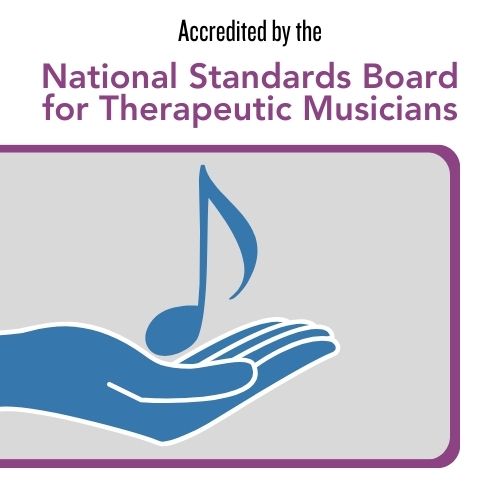FAQ
What is therapeutic music?
Therapeutic music is an art based on the science of sound. It is live acoustic music, played or sung, specifically tailored to the patient’s immediate need, which brings music’s intrinsic healing value to the bedside of the ailing.
Can all types of musicians enter the program?
There are many types of instruments that are appropriate for bedside work and can be used in this program. We have students and graduates who use the harp, keyboard, Native American flute, viola, voice, flute, guitar, hammered dulcimer, auto-harp, and others. Some instruments, such as the trumpet, trombone, piccolo, banjo, saxophone, accordion, or other instruments with loud or piercing sound would not be suitable for this work.
How long does it take to complete the program?
There is not a strict time frame for completing the program. Your musical proficiency when you enter the program and the amount of time you have to devote to the program will be the main factors in how long it takes to complete the program. Most students take 6 to 12 months to complete each level, while a few have completed both levels in as little as 4-6 months.
Is there a maximum time in which the program must be completed?
No, the program is designed for flexibility and to allow students to adjust the time they are spending on the program based on life situations that arise. However, in order remain on "active" status and avoid penalties, a student must stay in contact with his/her mentor and make some sort of forward motion in the course. A student who does not contact his/her mentor and/or has no forward movement for six months will be placed on "inactive" status and will be required to pay a fee in order to return to "active" status. After a period of inactivity, a student may be required to purchase updated materials if necessary.
Is the program available to international students?
Harp for Healing CMCP has students and graduates in more than 15 different countries. The availability of email and on-line platforms like Zoom, Facetime, and others make it fairly easy to communicate over long distances. CMCP has mentors located in the USA, Canada, and Italy, who serve students around the world.
Who are the program mentors and what do they do?
Authorized CMCP mentors are graduates of this program who are experienced in the field. Each CMCP student is assigned a mentor who is available by phone, email, and/or online platforms. CMCP mentors answer questions, provide feedback and coaching on clinical music skills and experiences, provide guidance on moving through the course, offer encouragement, and support any self-imposed deadlines. The mentors tailor their support to meet each student’s needs.
Is there a minimum age requirement to register?
Students must be at least 16 years of age to begin CMCP Level 1. For Level 2, a student must be 18 years of age or older to receive certification.
What level of musical competency is needed to enter the program?
Students should be very comfortable with their instrument and have at least an early intermediate skill level to enter the program. Some musical skills can be developed while working through the course, but teaching beginning skills is beyond the scope of CMCP.
What level of musical competency is needed to graduate?
Students need to be able to play in a smooth, flowing and calming manner and be comfortable with their instrument and the therapeutic music style of playing. By its nature, therapeutic music is simple and less complex than performance music – virtuosity is not required.
How do you know which therapeutic music training program is right for you?
You will want to consider each NSBTM accredited program’s philosophy, delivery style and cost to determine what fits best with your needs and learning style. Feel free to call or email us to better understand how our program works.

